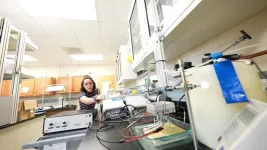(Press-News.org) Study: "Following the Letter of the Law: 2020–2021 Retention Outcomes Under Michigan’s Read by Grade Three Law"
Authors: Andrew Niel Utter (Michigan State University), John Westall (Michigan State University), Katharine O. Strunk (Michigan State University)
Embargoed until: 12:01 a.m. CT Friday, April 14
This study will be presented at the place-based component of the 2023 Annual Meeting of the American Educational Research Association.
Session: Minding the Gap in Accountability Policy Implementation
Date/Time: Friday, April 14, 2:50 p.m. – 4:20 p.m. CT
Main Findings:
Under Michigan’s “Read by Grade Three” grade retention law, school districts in 2020–21 disproportionately retain economically disadvantaged students, suggesting that students from more advantaged backgrounds avoid retention, potentially though better advocacy by their families.
While retention-eligible economically disadvantaged students are more likely to be retained than their peers just above the test-score cut-off, retention-eligible non-disadvantaged students are no more likely to be retained than their peers just above the cut-off.
Details:
Nineteen states, including Michigan, have early literacy policies that require grade retention for third-grade students who do not perform at a specific level on the states’ end-of-year summative English Language Arts achievement tests.
Michigan’s law requires districts to retain students in third grade if they do not meet a specified cut-point on the state’s end-of-year standardized achievement test, the Michigan Student Test of Educational Progress (M-STEP).
However, students who score at or below the cut-point may qualify for “good cause exemptions,” allowing them to be promoted to fourth grade despite their M-STEP score, with additional intensive academic assistance.
The authors found that Black and economically disadvantaged students were more frequently eligible for retention and more frequently retained than their peers.
After controlling for students’ test performance, the authors found no evidence that districts disproportionately retained Black students at significantly higher rates than other similarly performing students. However, after controlling for students’ test performance, the authors found that districts disproportionately retained economically disadvantaged students in comparison to their peers from more advantaged backgrounds.
While retention-eligible economically disadvantaged students were more likely to be retained than their peers just above the test-score cut-off, retention-eligible non–disadvantaged students were just as likely to be retained as their peers just above the cut-off.
“Our results provide evidence that students from more advantaged backgrounds avoid retention, possibly through better advocacy by their families,” said study coauthor Katharine O. Strunk, a professor of education policy at Michigan State University. “Given what we know about the potentially negative impact of retention policies on students, especially those from disadvantaged backgrounds, our findings are highly relevant to policymakers and education leaders.”
The authors note that wealthier students in Michigan also potentially have more resources to switch schools to avoid grade retention, as retention decisions are made at the district rather than the state level.
Previous research has found mixed evidence on the effectiveness of grade retention in improving short- and long-term outcomes and on the potential impact on student self-efficacy, sense of belonging, and future criminal activity. Moreover, there are concerns that retention will disproportionately impact traditionally disadvantaged student groups, resulting in disproportionate harm.
The authors analyzed administrative data from the Michigan Department of Education on 100,054 third-grade students during the 2020–21 school year.
To request a copy of the working paper, or to talk to the study author, please contact AERA Communications: Tony Pals, Director of Communications, tpals@aera.net, cell: (202) 288-9333; Marla Koenigsknecht, Communications Associate, mkoenigsknecht@aera.net, cell: (517) 803-1591.
###
About AERA
The American Educational Research Association (AERA) is the largest national interdisciplinary research association devoted to the scientific study of education and learning. Founded in 1916, AERA advances knowledge about education, encourages scholarly inquiry related to education, and promotes the use of research to improve education and serve the public good. Find AERA on Facebook, Twitter, LinkedIn, and Instagram.
END
Study snapshot: Following the letter of the law: 2020–2021 retention outcomes under Michigan’s Read by Grade Three Law
2023-04-14
ELSE PRESS RELEASES FROM THIS DATE:
The ACMG publishes statement on clinical, technical and environmental biases influencing equitable access to clinical genetics/genomics testing
2023-04-14
With the goal of fostering awareness and identifying strategies to reduce bias within the medical genetics field and to improve health equity, members of the ACMG’s Social, Ethical and Legal Issues (SELI) and Diversity, Equity and Inclusion (DEI) Committees collaborated to address factors in which bias can occur in clinical genetic testing in a just-published statement, “Clinical, technical, and environmental biases influencing equitable access to clinical genetics/genomics testing: A points to consider statement of the American College of Medical Genetics and Genomics (ACMG)”.
This is the first joint statement of the ACMG’s ...
Improving community outreach and engagement
2023-04-14
As researchers continue to make advances in new cancer prevention and treatment methods, it will not have much impact if the community is unaware and not engaged. For this reason, community outreach and engagement (COE) efforts are an important pillar of the University of Cincinnati Cancer Center’s mission.
Cancer Center researchers will present research abstracts on several COE initiatives at the American Association for Cancer Research Annual Meeting 2023, held in Orlando, Florida, April 14-19.
Encouraging ...
Healing the unhealable: New approach helps bones mend themselves
2023-04-14
Young babies and newborn mice can naturally heal damage to the bones that form the top of the skull, but this ability is lost in adults. In a new study published in Proceedings of the National Academy of Sciences, University of Pittsburgh researchers developed a novel approach that promoted bone regeneration in mice without implantation of bone tissue or biomaterials.
The technique uses a device similar to an orthodontic wire used to realign teeth to carefully stretch the skull along its sutures, activating ...
Scientists narrow down pool of potential height genes
2023-04-14
When it comes to height, our fate is sealed along with our growth plates—cartilage near the ends of bones that hardens as a child develops. Research publishing April 14 in the journal Cell Genomics shows that cells in these plates determine the length and shape of our bones and can hint at our stature. The study identified potential "height genes" and found that genetic changes affecting cartilage cell maturation may strongly influence adult height.
"The study is really understanding ...
Finding the dream team to beat the heat
2023-04-14
Associate Professor Jonathan Boreyko leads a team at Virginia Tech that has built a strong portfolio of work with ice and water, exploring the possibilities for de-icing planes, building novel water harvesting devices, and creating snow globes out of bubbles. This familiarity with water has given the team a strong sense of its behavior in different states, leading to a new project that shows how ice quenches heat in comparison to water. The findings were published in Chem on April 14.
Mojtaba Edalatpour and master’s student Camryn ...
Analysis of health and prescription data suggests chronic health conditions in U.S. incarcerated people may be severely undertreated
2023-04-14
Chronic conditions such as type 2 diabetes, asthma, HIV infection, and mental illness may be greatly undertreated in the U.S. jail and prison population, suggests a new study from researchers at the Johns Hopkins Bloomberg School of Public Health.
For their analysis, the researchers used national health survey data covering 2018 to 2020 to estimate rates of chronic conditions among recently incarcerated people, and a commercial prescription database to estimate the distribution of medication treatments to the jail and prison population. Their analysis suggests ...
In-person vs virtual education and community COVID-19 case incidence following school re-openings
2023-04-14
About The Study: In a study of matched pairs of counties that reopened with in-person versus virtual instruction at the secondary school level in the 2020 to 2021 academic year, counties with in-person school instructional models early in the COVID-19 pandemic experienced increases in county-level COVID-19 incidence at six and eight weeks after in-person reopening, compared with counties with virtual instructional models.
Authors: Meredith Matone, Dr.P.H., of Children’s Hospital of Philadelphia, is the corresponding author.
To access the embargoed study: Visit our For The ...
Black representation in the primary care physician workforce and its association with population life expectancy
2023-04-14
About The Study: The findings of this study of survival outcomes for 1,618 U.S. counties suggest that greater representation of Black primary care physicians (PCPs) in the PCP workforce is associated with improved survival-related outcomes for Black individuals, although there was a dearth of U.S. counties with at least one Black PCP during each study time point. Investments to build a more representative PCP workforce nationally may be important for improving population health.
Authors: John E. Snyder, M.D., M.S., M.P.H., and Rachel D. Upton, Ph.D., of the U.S. Department of Health and Human Services in Rockville, Maryland, are the corresponding ...
Racial, ethnic differences in barriers faced by medical college admission test examinees
2023-04-14
About The Study: In this study of 81,755 Medical College Admission Test examinees, American Indian or Alaska Native, Black, and Hispanic students reported lower parental educational levels, greater educational and financial barriers, and greater discouragement from pre-health advisers than white students. These barriers may deter groups underrepresented in medicine from applying to and matriculating at medical school.
Authors: Jessica Faiz, M.D., M.S.H.P.M., of the Veterans Affairs Greater Los Angeles Healthcare System and UCLA in Los Angeles, is the corresponding ...
Calling AI experts! Join the hunt for exoplanets
2023-04-14
Artificial Intelligence (AI) experts have been challenged to help a new space mission to investigate Earth’s place in the universe.
The Ariel Data Challenge 2023, which launches on 14 April, is inviting AI and machine learning experts from industry and academia to help astronomers understand planets outside our solar system, known as exoplanets.
Dr Ingo Waldmann, Associate Professor in Astrophysics, UCL (University College London) and Ariel Data Challenge lead said:
“AI has revolutionised many fields of science and industry in the past years. The field of exoplanets has fully arrived in the era of big-data and cutting edge AI is needed to break ...




